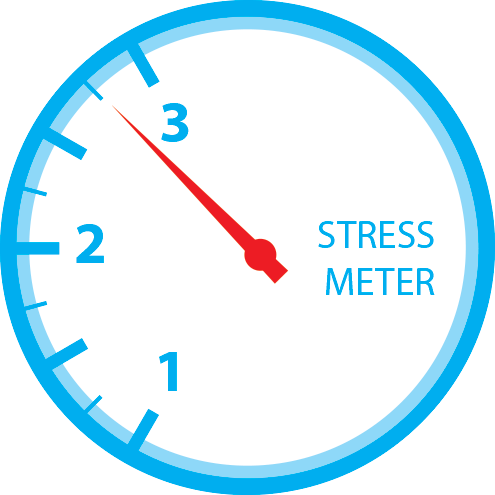Work-related stress doesn’t hit you over night. It builds up. When you know the warning signs, it’s easier to cope with stress and prevent a complete meltdown.
Let me ask you; how often do you spend your free time thinking about work or worrying about what goes on at the office? Modern technology is a blessing, but also a curse if not managed properly. How many of us feel the need to check our e-mails during our free time? The phenomenon of being always on has messed up our work-life-balance. A consequence of always being on is that more and more people experience stress in their everyday lives. Just how stressed out are you? And are you aware of it?
I’ve been a small business owner for about seven years now. I’ve worked as a freelance writer for corporations and various media while working in healthcare. Working with different clients and customers demanded an ability to balance between their interests, which led to working 12-14 hours a day for periods of time. I had a great work-life balance – just minus the life part.
After a while, I discovered more and more people within my network were dropping like flies. Journalists, designers, doctors… Stress just got to them and they were out for quite some time, doing nothing but counting cracks in the celling in their bedrooms. Not because they were lacy, but because their brains wouldn’t allow them to do anything else. Everything just shut down – collapsed!
Seeing people around me succumb to stress made me aware of the phenomenon. I started to ask myself how I could avoid being hit by the same mental freight train. I didn’t like what stress could do to me. And if I was knocked out cold, I might as well close shop. However, before I could react to stress, I had to find out just how stressed out I was.
Today, I live by a “stress meter.” This is my personal measurement system for stress, which I’ve developed over the years. The stress meter has various intervals with physical and psychological symptoms. Whenever I become aware of the symptoms of stress, I take a step back and try to place them in the stress meter to find out just how stressed I am – and what to do. Identify the magnitude of the problem, then you have a better chance of reacting accordingly.
Level 1
Just psychological effects: Everything is peachy; I sleep soundly at night, I remember my appointments, I have energy for other people, I’m not easily distracted and my mind doesn’t feel foggy.
Level 1,25
I sometimes forget where I put my things or forget why I got up from my chair. Otherwise, I feel fine physically and mentally.
Level 1,5
I forget things regularly, I feel distracted by random impressions and have a slight difficulty focusing on just one task.
Level 1,75
I’m often forgetful and distracted. It takes some time to focus and get things going creatively. I experience difficulty sleeping soundly at night.
Level 2
Psychological and physiological effects: I sometimes feel dizzy. I sometimes forget even important matters unless they’re written down on a piece of paper in front of me. I don’t sleep well from time to time. Focus takes me a while and I’m often distracted.
Level 2,25
A bad night’s sleep happen frequently – and I often feel the need to take a nap during the afternoon. Dizziness and forgetfulness happen often. Focus doesn’t come easily. Irritation over little things.
Level 2,5
Add stomach cramps, muscle tension in the shoulders and indigestion to the list. Dizziness and pounding pulse along with the feeling that I’ve often have had one cup of coffee to many – even though I haven’t had coffee that day.
Level 2,75
Regular, severe stomach pain and general muscle tension. I sleep horribly at night and I often don’t sleep for more than a couple of hours straight before waking up. Elevated pulse and pounding heart. Forgetfulness – even important appointments. I can’t be around people for long before I become irritated and highly sensitive. I often find myself confused when receiving even the simplest instructions.
Level 3
Complete meltdown!
Again, this is my personal stress meter, which applies to me. It has taken me years of experience with stress to map the various symptoms. I have luckily never reached level 3 because I have been able to identify the symptoms before it was too late. As I mentioned, I know people who were less fortunate and experienced the complete meltdown – a few were even hospitalized.
Now, why bother with a stress meter and what good is it to you? Well, in order to discover you’re sick, you need to know the symptoms. We all know the symptoms of the flu and once they’re identified, we can react accordingly. If you develop your own personal stress meter, maybe you can discover the symptoms of stress early on and cut down on your work load and other things that trigger the symptoms.
Fighting stress is something we can only do for ourselves. No one can give you a magic pill and puff, your stress is gone! It is something you have to do. After becoming aware of my personal symptoms of stress, I haven’t reached level 2,25 for quite some time. I’ve been successful in reducing stress before it got out of hand.
Next week, I’ll write more about what you can do to reduce stress – besides cutting down on work.
Kasper Nesager-Hansen
Co-Founder and Managing Partner





